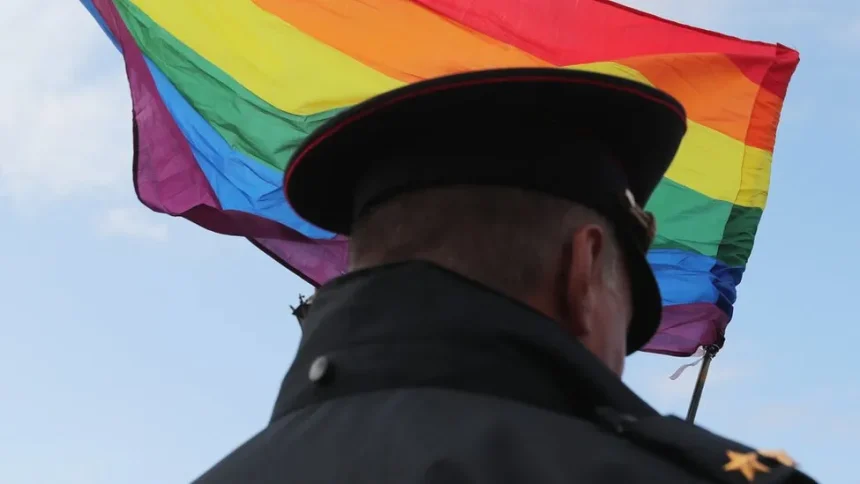Russia’s Supreme Court has labeled “the international LGBT public movement” an extremist organization and has outlawed its operations throughout the country.
A motion from the justice ministry prompted the ruling, despite the fact that no such organization exists as a legal body.
Although the hearing was held behind closed doors, media were permitted to attend to hear the court’s ruling. According to the court, no one from “the defendant’s side” was present.
Three years ago, Russia’s constitution was amended to clarify that marriage is defined as a relationship between a man and a woman. Same-sex unions are not recognized in this country.
I asked Sergei Troshin, a municipal deputy in St Petersburg who came out as gay last year, what impact the verdict might have.
“I think this will mean that anyone whom the state considers an LGBT activist could receive a long prison sentence for ‘participating in an extremist organisation’,” he added.
“The prison term for the organizer of such a group will be even longer.”
“This is genuine repression.” The Russian LGBT community is in a state of terror. People are fleeing in large numbers. We’re actually talking about evacuation. We are being forced to flee our own nation. It’s dreadful.”
The authorities have increased their pressure on Russia’s LGBT community in recent years. A law forbidding “the propaganda [among minors] of non-traditional sexual relations” was passed in 2013.
In Russia, these limitations were expanded to all age groups last year. LGBT references have been removed from books, films, advertisements, and television broadcasts. To avoid being accused of violating the “gay propaganda” ban, one Russian TV channel discolored a rainbow in a South Korean pop video earlier this month.
At the Duma, Russia’s lower house of parliament, Vitaly Milonov, a notoriously homophobic MP from the ruling party, United Russia, stated that the ban on LGBT groups was “not about sexual minorities or individual private lives.”
“It’s more about the political agenda proclaimed by this LGBT international movement,” that’s what he said.
“They each have their own tasks and objectives.” They operate as a political force, a political organization, and the purposes of this structure are in violation of the Russian Constitution.”
“You’re talking about a political structure,” I said. “However, there is no such thing as the ‘International LGBT public movement.’ “How do you prohibit something that does not exist?”
“Oh, it’s easy,” Mr Milonov said. “We have the authority to prohibit any activities of LGBT international organizations in Russia.” That’s great. We don’t require them.
“And I’m looking forward to the next step, which is to outlaw the six-color rainbow flag.” We don’t require this flag. It represents the struggle against the traditional family. I hope no one can display this flag in Russia.”
The Kremlin has embraced an ideology centered on conservative thought and “traditional family values” under Vladimir Putin. The authorities characterize LGBT activism as intrinsically Western and anti-Russian. Pressure on the LGBT community is framed as a way of safeguarding Russia’s moral fabric.
Is it also a possible vote winner?
“I believe [the court hearing] is related to the presidential election next March,” Sergei Troshin believes. “[The authorities] are creating an artificial enemy.”
“They say, ‘We are fighting the West.'” The conflict with LGBT individuals is consistent with this anti-Western discourse. Fighting both the West and the LGBT community is popular among conservative, anti-Western groups. As a result, this issue will be raised in the run-up to the election.”
“They’re trying to distract attention from more important problems, which the Russian authorities don’t want people to think about,” Goldman adds. He works for a Russian organization that provides assistance to transgender and non-binary people.
“As soon as we heard about the Supreme Court hearing, the people in charge of our organization realized we needed to leave the country right away.” It escalated into an emergency.”
On his last day in Russia, I spoke with Maxim, who identifies as non-binary. He had a little luggage packed and was on his way to the airport.
“I feel totally rejected by my own country,” he told reporters. “This is supposed to be a democracy.” The individuals we elect are meant to look after us.
“However, the opposite is occurring. They’re chastising us. They are scrubbing their feet on us. “I’m being pushed out.”
Sergei Troshin, a municipal deputy, is remaining for the time being. But he is not delusory.
“I’ve spoken a lot about LGBT rights in the past,” Sergei says. “It’s possible that this will be enough to warrant a criminal investigation against me.” I hope not, but it’s possible. And it’s terrifying.
“Fear pervades Russian society.” You’re walking through a minefield with every word. Say one thing and you could receive five years in prison; say something different and you could get ten or fifteen years.”














